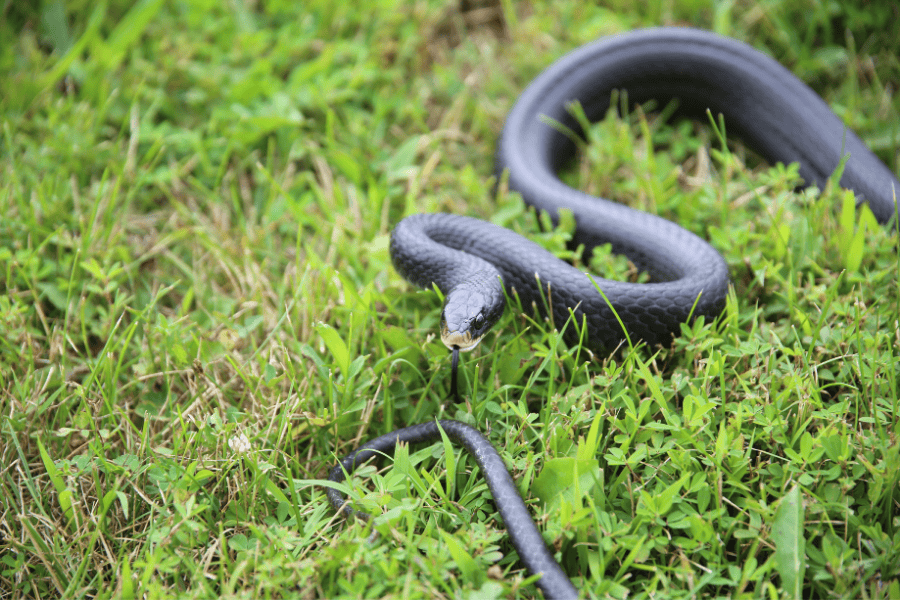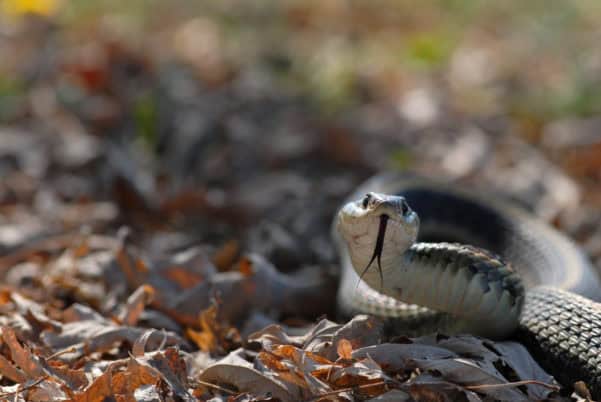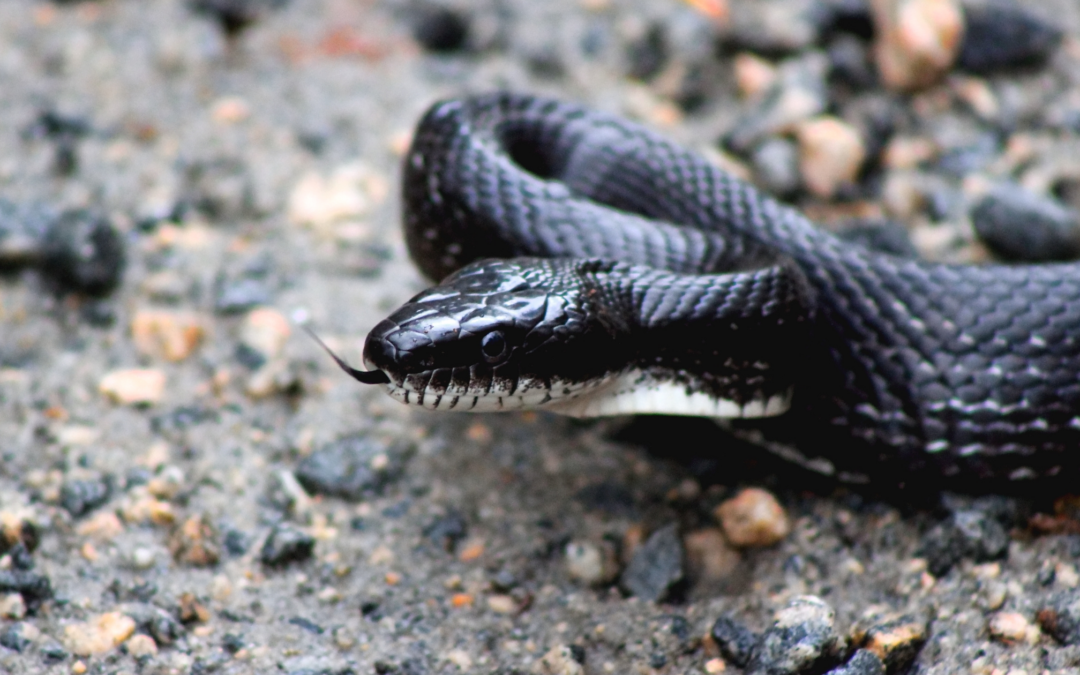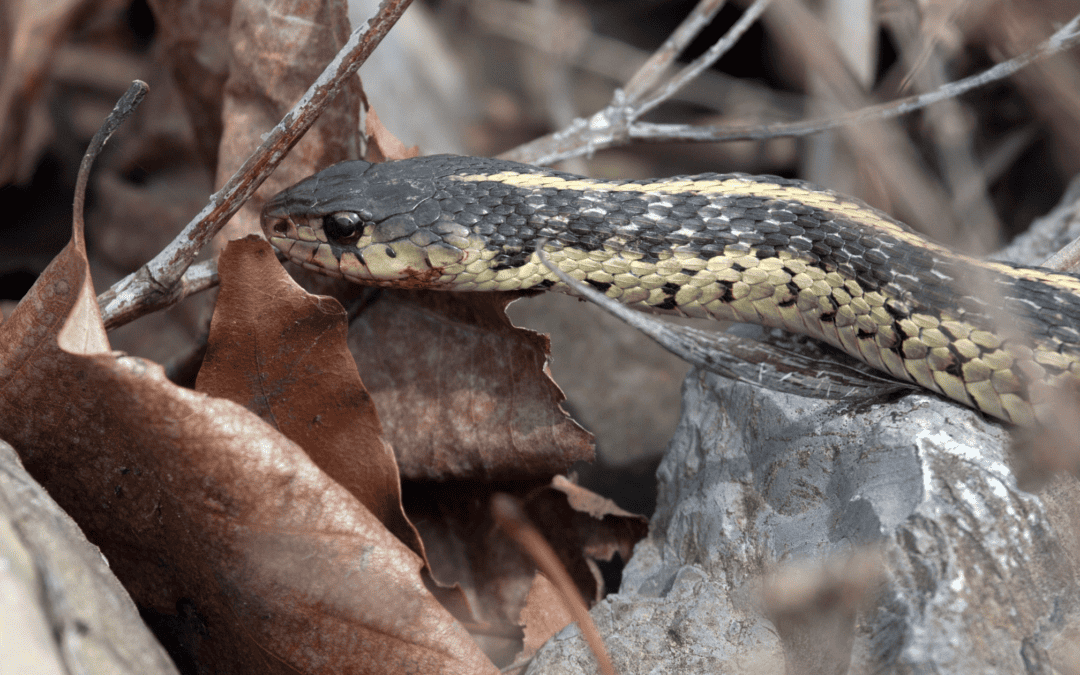
Feb 14, 2025 | Wildlife
Georgia is home to a wide variety of snake species, both venomous and non-venomous. While most snakes play a vital role in the ecosystem by controlling rodent populations, their presence in and around homes can be unsettling. Understanding snake behavior, knowing what to do if you encounter one, and exploring snake pest control options can help you manage and prevent unwanted snake encounters.
Snake Pest Control in Georgia
Common Snakes Found in Georgia
Georgia has over 40 snake species, with only a few being venomous. Knowing the difference can help you determine whether a snake poses a danger.
Non-Venomous Snakes
- Eastern Rat Snake – Often found near barns, attics, and basements, these snakes help control rodent populations.
- Black Racer – Fast-moving and non-aggressive, these snakes are commonly seen in yards and gardens.
- Garter Snake – Recognizable by their striped pattern, they are harmless and frequently found in grassy areas.
- Corn Snake – Sometimes mistaken for copperheads, corn snakes are non-venomous and excellent at controlling pests.
Venomous Snakes
- Eastern Diamondback Rattlesnake – The largest venomous snake in the U.S., found in pine forests and coastal areas.
- Copperhead – Often camouflaged in leaves, copperheads are responsible for many snake bites in Georgia.
- Cottonmouth (Water Moccasin) – Typically found near water, they are aggressive and highly venomous.
- Timber Rattlesnake – Found in wooded areas, these snakes deliver a dangerous bite.
- Coral Snake – Rare but venomous, coral snakes have bright red, yellow, and black bands.
What to Do If You Encounter a Snake
Encountering a snake can be alarming, but staying calm is crucial. Here’s what you should do:
- Identify from a Safe Distance – Avoid approaching or handling the snake.
- Back Away Slowly – Snakes are unlikely to attack unless threatened.
- Secure Children and Pets – Keep them away from the snake’s path.
- Do Not Attempt to Kill It – Many snake bites occur when people try to kill or handle them.
- Call a Professional – If you suspect the snake is venomous or it is in your home, contact a snake removal expert.
Can Pest Control Get Rid of Snakes?
Many people wonder, “Can pest control get rid of snakes?” While traditional pest control focuses on insects and rodents, some wildlife control companies specialize in snake removal. These services include:
- Snake Trapping and Removal – Humane traps are used to capture and relocate snakes.
- Property Inspections – Professionals inspect your home for entry points and recommend sealing gaps and cracks.
- Habitat Modification – Removing debris, tall grass, and woodpiles makes your property less attractive to snakes.
- Rodent Control – Since snakes follow their food source, controlling rodents can reduce snake sightings.
What Keeps Snakes Away?
To prevent snakes from entering your property, consider the following snake control strategies:
Eliminate Food Sources
Snakes are drawn to areas with ample food. Reducing rodents, insects, and bird eggs in your yard can deter them.
Modify Landscaping
- Trim Grass and Bushes – Keep your lawn short and bushes trimmed to reduce hiding spots.
- Remove Woodpiles and Clutter – Snakes often hide in stacked wood, debris, and overgrown vegetation.
- Use Snake-Repellent Plants – Plants like marigolds, lemongrass, and wormwood may deter snakes.
Seal Entry Points
Snakes can enter homes through tiny gaps. Seal cracks, holes, and vents with mesh or caulk to prevent entry.
Use Snake Repellents
There are natural and commercial snake repellents available, including:
- Sulfur and Naphthalene – Found in snake repellent granules.
- Essential Oils – Clove and cinnamon oil sprays may repel snakes.
- Commercial Repellents – Products specifically designed for snake deterrence.
Snake Removal: When to Call a Professional
If you frequently see snakes on your property or inside your home, it’s time to call a wildlife control company. Professional snake removal services ensure:
- Safe Handling and Relocation – Experts use proper tools to remove snakes without harm.
- Snake Identification – Professionals determine if the snake is venomous.
- Prevention Plans – Wildlife control experts help keep snakes from returning.
Conclusion
Snakes are an essential part of Georgia’s ecosystem, but they can be a nuisance when they invade homes and yards. By identifying common snake species, knowing what to do if you encounter one, and implementing snake pest control strategies, you can minimize encounters. If you have persistent snake problems, a professional wildlife control company can provide safe and effective snake removal solutions.
For expert assistance in handling snakes on your property, contact a trusted pest control company specializing in snake control and wildlife removal.

Sep 4, 2024 | Florida Pest Control
Florida’s diverse wildlife includes a range of snake species. While most are harmless and play important roles in our ecosystem, it’s always good to be aware of what you might encounter and how to keep your yard snake-free. Here’s a friendly look at common Florida snakes and simple tips for keeping snakes out of your yard.
Keeping Snakes Out of Your Yard
Common Snakes in Florida
- Eastern Garter Snake: These small, harmless snakes have distinct stripes running down their bodies. They are often found in gardens, meadows, and wooded areas.
- Southern Black Racer: Slender and black, these snakes are fast movers and can often be mistaken for a more dangerous species. You’ll likely find them in open areas, including yards and grassy fields.
- Eastern Coral Snake: Known for their bright red, yellow, and black bands, these are venomous but are rarely encountered by humans. These snakes prefer sandy or loose soils in wooded areas.
- Copperhead: Recognizable by its copper-colored head and hourglass-shaped bands, you will typically find them in wooded or rocky areas, sometimes near water.
- Black Pine Snake: These snakes are large and non-venomous. They have black bodies and white or yellow bellies. They will often live in sandy, well-drained soils in pine forests.
Easy Ways to Prevent Snakes
- Maintain a Clean Yard: Snakes love clutter and tall grass, which offer perfect hiding spots. Look to regularly mow your lawn, trim bushes, and remove piles of leaves and debris.
- Secure Your Yard: Snakes can enter through gaps or holes, so it’s crucial to check your yard’s fencing for gaps and ensure fencing is buried a few inches underground to prevent snakes from slithering through.
- Remove Food Sources: Snakes are attracted to places where they can find food, like rodents and insects. Place your pet food, bird seed, and other food in sealed containers to manage any rodent issues and ultimately prevent snakes from entering your yard.
- Use Snake-Repellent Plants: Some plants can naturally repel snakes with their strong odors. Consider planting marigolds, lemongrass, or garlic around your yard to keep snakes at bay.
- Monitor Water Sources: Standing water can attract snakes and their prey. Ensure there is proper drainage around your property and eliminate any sources of standing water in your yard.
- Use Outdoor Lighting Wisely: Excessive outdoor lighting can attract insects, which in turn attract snakes. Use motion-activated lights to reduce attraction to your yard.
If you notice more snakes on your property than you’re comfortable with, call a wildlife company near you. These experts will provide you with a snake removal and prevention plan for keeping snakes out of your yard in the future.

Jun 21, 2024 | DIY Pest Control, Wildlife
If you live in Georgia, you know that the state’s warm climate and diverse ecosystems are home to a variety of wildlife, including snakes. Encountering a snake in your yard or home can be unsettling, but knowing how to handle the situation safely is crucial. This guide will provide you with essential information on what to do if you come across a snake, how to identify venomous and nonvenomous snakes in Georgia, how to practice safe snake removal, and prevent snakes from entering your property.
What to Do If You Encounter a Snake
Outdoors:
- Stay Calm and Keep Your Distance: If you see a snake outdoors, remain calm. Most snakes are non-aggressive and will avoid humans if given the chance.
- Observe from a Safe Distance: Do not try to touch or provoke the snake. Take a few steps back and give it space to move away.
- Identify the Snake: Use binoculars or a zoom lens to get a closer look without getting too close. This can help in identifying whether the snake is venomous or nonvenomous.
Indoors:
- Do Not Panic: If you find a snake inside your home, do not panic. Most indoor encounters are with nonvenomous snakes.
- Contain the Snake: If possible, isolate the snake in a room by closing the door and placing a towel at the bottom to prevent it from escaping.
- Call a Professional: For safe snake removal, contact a wildlife control company. Search for “snake removal near me” to find local professionals who can handle the situation.
Identifying Venomous vs. Nonvenomous Snakes in Georgia
Georgia is home to both venomous and nonvenomous snakes. Here are key identifiers:
Venomous Snakes:
- Eastern Diamondback Rattlesnake: Large, heavy-bodied with diamond-shaped patterns and a rattle on the tail.
- Copperhead: Distinctive hourglass-shaped bands across the body.
- Cottonmouth (Water Moccasin): Thick body, dark crossbands, and a distinctively white mouth.
- Coral Snake: Brightly colored with red, yellow, and black bands. Remember the rhyme: “Red touches yellow, kills a fellow; red touches black, friend of Jack.”
Nonvenomous Snakes:
- Eastern Garter Snake: Striped pattern running lengthwise down the body.
- Rat Snake: Large and often black or yellow with a checkerboard pattern.
- King Snake: Black with white or yellow bands, often confused with the venomous coral snake.
Safe Snake Removal Methods
- Use a Snake Hook or Tongs: If you have experience, you can use snake hooks or tongs to safely remove a snake. These tools allow you to handle the snake without getting too close.
- Trap the Snake: Place a large bin or bucket over the snake, then gently slide a piece of cardboard underneath to lift and remove it.
- Contact Professionals: For those without experience, it’s best to call a wildlife control company. Professionals have the necessary tools and knowledge to handle snake removal safely.
Preventing Snakes from Entering Your Property
- Eliminate Food Sources: Snakes are attracted to areas with abundant prey. Keep your yard free of rodent populations and secure garbage bins.
- Remove Shelter: Clear away debris, woodpiles, and tall grass where snakes may hide.
- Seal Entry Points: Inspect your home for cracks and gaps. Seal openings around doors, windows, and foundations to prevent snakes from entering.
- Use Snake Repellent: Commercial snake repellents can be effective in deterring snakes from your property. Follow the instructions carefully for the best results.
- Maintain Your Yard: Regularly mow the lawn and trim bushes to reduce hiding spots for snakes.
Who to Call for Snake Removal
If you’re dealing with a snake problem and need professional help, search for “snake removal near me” to find a trusted wildlife control company in your area. These experts can safely and humanely remove snakes from your property and provide advice on preventing future encounters.
Encountering a snake can be a frightening experience, but with the right knowledge and precautions, you can handle the situation safely. Remember to stay calm, keep your distance, and contact professionals for help with snake removal. By taking steps to prevent snakes from entering your property, you can reduce the likelihood of future encounters. Stay vigilant, and don’t hesitate to reach out to wildlife control companies for expert assistance in managing your snake problem.

Mar 22, 2024 | Wildlife
Snakes, with their slithering presence and sometimes unnerving appearance, can be a concern for homeowners in Georgia. Whether you stumble upon one in your yard or suspect they might be lurking nearby, knowing how to handle these reptiles safely and effectively is essential. In this comprehensive guide, we’ll delve into common snakes found in Georgia, tips for avoiding snakebites, what to do if you encounter a snake, and strategies for keeping them away from your property. Plus, we’ll discuss the importance of professional snake removal services and how they can help alleviate your snake problem swiftly and securely.
Common Snakes in Georgia
Georgia is home to a variety of snake species, some of which are harmless while others pose a potential threat. Among the most common snakes you might encounter in the state are:
- Eastern Diamondback Rattlesnake
- Eastern Coral Snake
- Copperhead
- Cottonmouth (Water Moccasin)
- Eastern Garter Snake
- Eastern Rat Snake
- Eastern King Snake
While most snakes prefer to avoid human contact, encountering them in your yard or near your home can still be disconcerting, especially if you’re unsure of their species or venomous potential.
Tips for Avoiding Snakebites
Prevention is key when it comes to avoiding snakebites, particularly if you spend time outdoors or live in an area prone to snake activity. Here are some essential tips to keep in mind:
- Watch Your Step: When walking in areas where snakes may be present, such as tall grass, brush piles, or wooded areas, watch your step and avoid stepping over logs or rocks where a snake might be hiding.
- Wear Appropriate Footwear: Closed-toe shoes or boots can provide an extra layer of protection against snake bites, particularly in areas with dense vegetation.
- Use Caution Around Water: Snakes, particularly water moccasins and copperheads, are often found near bodies of water. Be cautious when swimming, fishing, or hiking near lakes, ponds, or streams.
- Stay Vigilant at Dusk and Dawn: Snakes are most active during the early morning and evening hours when temperatures are cooler. Exercise caution during these times, especially in areas known for snake activity.
- Keep Your Yard Tidy: Remove debris, such as piles of leaves, wood, or rocks, from your yard, as these can provide hiding spots for snakes. Trim back overgrown vegetation and mow your lawn regularly to reduce potential hiding places.
What to Do if You Encounter a Snake
If you come across a snake in the wild or in your yard, it’s essential to remain calm and take appropriate precautions. Follow these steps to safely handle the situation:
- Give the Snake Space: Back away slowly and give the snake plenty of room to retreat. Remember, snakes will typically only strike if they feel threatened or cornered.
- Do Not Attempt to Capture or Kill the Snake: Trying to capture or kill a snake can escalate the situation and increase the risk of a bite. Instead, contact a professional snake removal service to handle the situation safely.
- Keep Pets and Children Away: Ensure that pets and children are kept at a safe distance from the snake until it has been removed from the area.
- Note the Snake’s Appearance: If possible, take note of the snake’s color, size, and any distinctive markings. This information can be helpful for identifying the species and determining the appropriate course of action.
- Contact a Professional: If you’re unsure how to proceed or if the snake poses a potential threat, contact a reputable snake removal company for assistance.
Tips to Keep Snakes Away from Your Yard
Preventing snakes from entering your yard in the first place is the best way to avoid encounters and potential problems. Here are some tips to make your property less attractive to snakes:
- Eliminate Food Sources: Snakes are attracted to areas where they can find food, such as rodents, insects, and other small animals. Keep your property free of debris and garbage, and consider implementing pest control measures to reduce potential prey.
- Seal Entry Points: Inspect your home for any gaps or cracks where snakes could enter, such as gaps under doors, holes in walls, or gaps around pipes and utility lines. Seal these openings with caulk or other appropriate materials to prevent snakes from gaining access.
- Install Snake Fencing: Consider installing a snake-proof fence around your property to deter snakes from entering. Snake fencing is typically made of mesh or other materials that snakes cannot climb or slither through.
- Keep Grass Short: Regularly mow your lawn and trim back vegetation to reduce hiding places for snakes and make your property less appealing to them.
- Use Natural Repellents: Certain plants, such as marigolds, lemongrass, and garlic, are believed to repel snakes. Planting these around your home and yard may help deter snakes from entering the area.
Professional Snake Removal Services
In cases where snakes have already taken up residence on your property or pose a potential threat to your safety, professional snake removal services are the safest and most effective solution. These trained professionals have the knowledge, experience, and specialized equipment needed to safely remove snakes from your property without causing harm to the animals or risking injury to yourself or your family.
When choosing a snake removal company, be sure to look for one that is licensed, insured, and experienced in dealing with snake-related issues. Additionally, inquire about their removal methods and whether they offer humane relocation services for captured snakes.
In conclusion, while encountering snakes in your yard or outdoor spaces can be unsettling, knowing how to handle these situations safely and effectively is essential for your safety and the well-being of the snakes themselves. By following the tips outlined in this guide and enlisting the help of professional snake removal services when needed, you can minimize the risk of snake encounters and keep your property safe and snake-free.
Remember, when it comes to snake removal, safety always comes first. Trust the experts to handle the job safely and effectively, allowing you to enjoy your outdoor spaces without the worry of unwanted reptilian visitors.

Nov 24, 2023 | Wildlife
Georgia, with its diverse wildlife, is home to a variety of snake species. As temperatures begin to drop, many people wonder if snakes, like other animals, hibernate during the winter months. In this blog post, we’ll explore the intriguing world of snake hibernation, the differences between hibernation and brumation, and provide valuable tips for effective snake control in your Georgia home.
Do Snakes Hibernate?
Contrary to popular belief, snakes don’t undergo true hibernation. Instead, they enter a state called brumation. While hibernation involves a deep sleep, brumation is more of a slowed-down metabolic state. Snakes become less active, but they are not completely dormant. This adaptation allows them to conserve energy during colder months, making it easier to survive until warmer temperatures return.
Understanding Brumation
Brumation typically occurs when temperatures drop, signaling snakes to find a sheltered spot to wait out the cold season. Unlike mammals in hibernation, snakes may occasionally emerge during milder days to bask in the sun and regulate their body temperature. Understanding this behavior is crucial for effective snake control, especially if you want to keep these slithering creatures away from your property.
Tips for Snake Control in Georgia
- Seal Entry Points: Snakes are excellent at finding small openings to enter homes. Inspect and seal any gaps or cracks in the foundation, walls, and windows to prevent them from slithering in.
- Trim Vegetation: Keep your yard well-maintained by trimming tall grass, bushes, and overgrown vegetation. Snakes seek shelter in these areas, so reducing hiding spots decreases the likelihood of them setting up residence in your yard.
- Remove Attractants: Snakes are attracted to areas with abundant prey. Minimize potential food sources such as rodents by keeping trash sealed, cleaning up fallen fruits, and securing pet food.
- Regular Inspections: Conduct regular inspections of your property, especially in warm seasons when snakes are more active. Early detection can prevent a snake population from establishing itself.
Concerned about snakes on your property? Our expert pest control team in Georgia is here to help! Whether you need snake removal or wildlife management, we offer effective and humane solutions. Request a free pest control quote today to safeguard your home and enjoy a snake-free environment.
Understanding the habits of snakes during colder months is essential for effective snake control in Georgia. By implementing these tips and being proactive, you can reduce the likelihood of encountering snakes on your property. For comprehensive snake removal and pest control services, reach out to an experienced pest control company. Enjoy peace of mind in every season with our reliable wildlife management solutions.
Request your free pest control quote today and keep your home snake-free!




